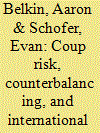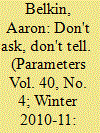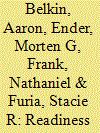|
|
|
Sort Order |
|
|
|
Items / Page
|
|
|
|
|
|
|
| Srl | Item |
| 1 |
ID:
069871


|
|
|
|
|
| Publication |
2005.
|
| Summary/Abstract |
Contrary to the literature on rallies-around-the-flag, this article argues that, in some circumstances, leaders may use international conflict to promote domestic divisiveness. More specifically, the threat of a military coup generally prompts leaders to divide their militaries (a practice known as counterbalancing), and even to engage in international conflict to ensure that various branches of their own armed forces remain distrustful of one another. Two empirical tests of these claims are offered: a large-N statistical analysis that examines whether coup risk leads to counterbalancing, and whether counterbalanced nations engage in more low-level military conflict (controlling for other causes of conflict); and a case study of Georgia shortly after the dissolution of the Soviet Union. Both empirical studies support the arguments advanced by the authors.
|
|
|
|
|
|
|
|
|
|
|
|
|
|
|
|
| 2 |
ID:
081066


|
|
|
|
|
| Publication |
2008.
|
| Summary/Abstract |
This article asks what impact, if any, the "don't ask, don't tell" policy might have on the U.S. military's reputation. Original empirical research is presented to suggest that the policy harms the military's reputation in four ways: the policy is inconsistent with public opinion, it prompts many journalists to criticize the armed forces while attracting almost no favorable media coverage, it provides a vehicle for antimilitary protesters to portray military culture as conflicting with widely accepted civilian values, and it is inconsistent with the views of junior enlisted service members
|
|
|
|
|
|
|
|
|
|
|
|
|
|
|
|
| 3 |
ID:
107344


|
|
|
| 4 |
ID:
124059


|
|
|
|
|
| Publication |
2013.
|
| Summary/Abstract |
Prior to the repeal of "don't ask, don't tell" (DADT) on September 20, 2011, many observers predicted that allowing lesbian, gay and bisexual troops to serve openly would harm the military, and a group of more than 1,000 retired general and flag officers predicted that repeal could "break the All-Volunteer Force." This study is the first scholarly effort to assess the accuracy of such predictions about the impact of DADT repeal on military readiness. We conducted our research during the half-year period starting six months after repeal and concluding at the one year mark, and we pursued ten separate research strategies including in-depth interviews, survey analysis, on-site field observations, pretest/posttest quasi experimentation, secondary source analysis, and a comprehensive review of media articles. Our goal was to maximize the likelihood of identifying evidence of damage caused by repeal, and we made vigorous efforts to collect data from repeal opponents including anti-repeal generals and admirals, activists, academic experts, service members and watchdog organizations. Our conclusion, based on all of the evidence available to us, is that DADT repeal has had no overall negative impact on military readiness or its component dimensions, including cohesion, recruitment, retention, assaults, harassment, or morale. If anything, DADT repeal appears to have enhanced the military's ability to pursue its mission.
|
|
|
|
|
|
|
|
|
|
|
|
|
|
|
|
|
|
|
|
|